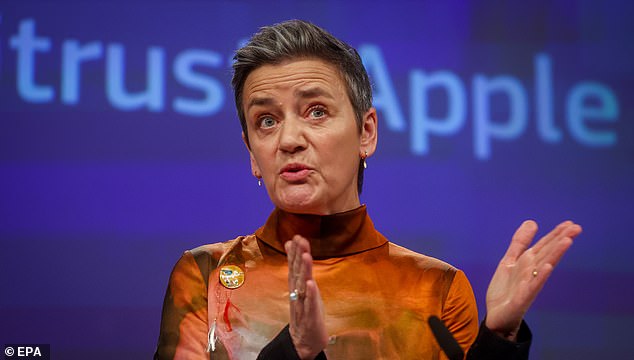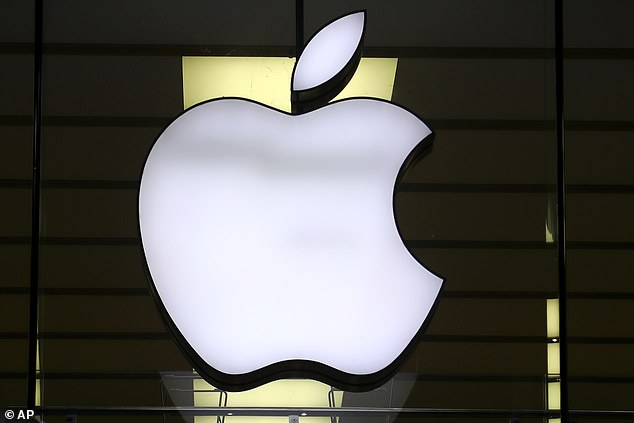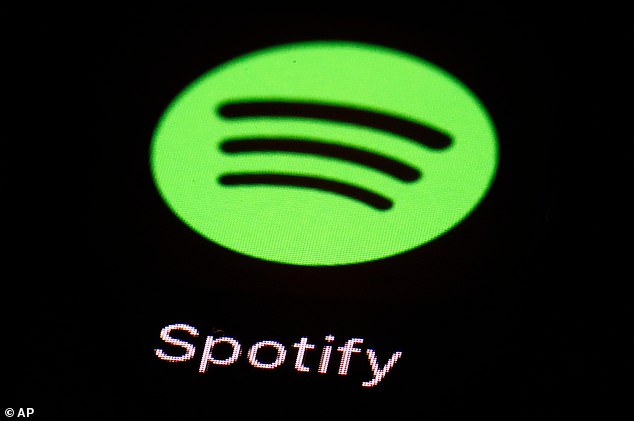The European Union slapped Apple with a massive $2 billion fine after finding the tech giant unfairly favored its own music streaming service over rivals such as Spotify.
Apple banned app developers from “fully informing iOS users about alternative, cheaper music subscription services outside the app,” said the European Commission, the executive arm of the 27-nation bloc and main antitrust body.
That’s illegal under EU antitrust rules. Apple behaved this way for nearly a decade, which meant many users paid “significantly higher prices for streaming music subscriptions,” the commission said.
The fine comes after a long investigation initiated by a Spotify complaint five years ago.
In response to the fine, Apple issued a statement alleging that the commission had found “no credible evidence of consumer harm and ignores the realities of a market that is prosperous, competitive and rapidly growing.”

At a press conference on Monday, Margrethe Vestager, executive vice president of the European Commission, accused Apple of “abusing” its position.


The fine comes five years after Spotify first complained that Apple unfairly favored its own music streaming.


In response to the fine, Apple said the evidence did not support the commission’s decision and that Spotify pays “nothing” to be present in the App Store.
“While we respect the European Commission, the facts simply do not support this decision,” the statement continued. Apple has promised to appeal the ruling.
The statement goes on to note that Spotify pays Apple “nothing for the services that have helped make it one of the most recognized brands in the world.”
“We are proud to play a key role in supporting Spotify’s success, as we have done for developers of all sizes,” the statement noted.
At a press conference on Monday, Margrethe Vestager, executive vice president of the European Commission, accused Apple of “abusing” its position.
‘For a decade, Apple abused its dominant position in the market for distributing streaming music applications through the App Store. From now on, Apple will have to allow streaming music developers to communicate freely with their own users.’
“(The fine) reflects both Apple’s financial power and the harm that Apple’s conduct inflicted on millions of European users,” Vestager said.
The EU has led global efforts to crack down on big tech companies, including a series of multibillion-dollar fines for Google and accusing Meta of distorting the online classifieds market.
The commission also opened a separate antitrust investigation into Apple’s mobile payments service.
The commission’s investigation initially focused on two concerns.
One was the iPhone maker’s practice of forcing app developers that sell digital content to use its internal payment system, which charges a 30 percent commission on all subscriptions.
But the EU later abandoned that to focus on how Apple prevents app makers from telling their users about cheaper ways to pay for subscriptions that don’t involve going through an app.
The investigation found that Apple prohibited streaming services from telling users how much subscription offers cost outside of their apps, including links in their apps to pay for alternative subscriptions or even sending emails to users to tell them about different pricing options. .
The fine comes the same week that new EU rules aimed at preventing technology companies from dominating digital markets will come into force.
The Digital Markets Act, which goes into effect on Thursday, imposes a series of do’s and don’ts on ‘gatekeeper’ companies, including Apple, Meta, Google parent Alphabet, and TikTok parent ByteDance , under threat of heavy fines.
The DMA provisions are designed to prevent tech giants from engaging in the type of behavior that is at the center of the Apple investigation.
Apple has already revealed how it will comply, including allowing iPhone users in Europe to use app stores other than its own and allowing developers to offer alternative payment systems.
The commission also opened a separate antitrust investigation into Apple’s mobile payments service, with the company promising to open its tap-and-go mobile payments system to rivals to resolve it.

